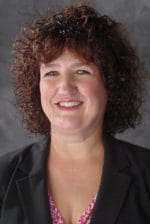
March 2018 | Q&A Spotlight
Making specialty care accessible: Talking with Melissa Johnson of Project Access Northwest
Making specialty care accessible: Talking with Melissa Johnson of Project Access Northwest
 Melissa Johnson is the Deputy Executive Director for Project Access Northwest, a Seattle based non-profit dedicated to improving access to specialty health care for low-income and uninsured patients, serving King, Kitsap and Snohomish counties. She is an experienced development professional with a demonstrated history of working in the hospital and healthcare industry.
Melissa Johnson is the Deputy Executive Director for Project Access Northwest, a Seattle based non-profit dedicated to improving access to specialty health care for low-income and uninsured patients, serving King, Kitsap and Snohomish counties. She is an experienced development professional with a demonstrated history of working in the hospital and healthcare industry.
What do you want readers who are unfamiliar with Project Access Northwest to know about your organization?
Project Access Northwest connects patients to life-saving and life-changing care in more than 40 specialties including cardiology, oncology and neurology to name a few. We are able to work with nearly all of the community health centers, free and faith-based clinics, specialty medical groups, hospitals and hospital systems within our three-county service area to provide care free of charge to our patients. We also work with our patients to provide health care education and help them achieve their personal health goals. At the end of 2017, we had served more than 44,000 patients since our founding in 2006.
What do you see as the biggest challenge related to the issue of access to healthcare in Seattle?
We see access itself as the big challenge in this region and there are many intersecting forces that create that challenge. Patients face language barriers, low health care literacy, inability to pay the tremendous costs of specialty care and challenges with childcare, transportation and employment schedules. In addition, specialty appointments often require additional tests, images, or labs. This can all be difficult to navigate. Specialty providers want to donate care, but they have to support the tremendous costs of running a specialty care practice. When they want to serve this population, they bear the costs for administrative work, schedulers, office space, clinicians and ancillary services. A compounding problem is that because of the many challenges they face, this population has a no-show rate of around 30%, which isn’t sustainable for a provider. That’s where our work comes in. Removing all of these barriers is why we were created.
On a larger scale, the national health care climate and surrounding uncertainty has definitely impacted access. We are seeing a lot of fear in our immigrant community and they are not coming out to appointments or getting even their basic health care needs met. We can’t reach the people who need us if they are afraid to let us know who they are.
What are the most exciting trends or opportunities for solving access issues?
While this isn’t a new trend, the generosity and willingness of the Seattle medical community to serve a low-income population and find solutions is inspiring. All of our providers, medical specialty groups, and hospital partners work tirelessly to ensure that the needs of our population are being met. The number of volunteers who serve our patients increases every year.
Project Access Northwest is also excited about the way local and regional government is supporting access measures. There is an awakening of sorts happening as the Affordable Care Act has evolved and in light of national conversations. Lawmakers are realizing not only that caring for the population is the right thing to do, it makes financial sense. Providing people access to the appropriate care they need at the appropriate time makes the entire community healthier and reduces the burden of charity care on everyone, especially over-filled emergency departments.
As technology consultants, we are interested in how technology impacts non-profits and the communities they serve. How does Project Access Northwest use technology to further its mission?
Technology is critical to our work, but it is terribly expensive to have the latest and most robust systems. As a relatively small nonprofit, we are not able to negotiate the lowest costs or highest functionality and when we look to make upgrades, we always have to weigh it against how many fewer patients we can serve or whether there are grant funds available.
The systems we do have in place are primarily for patient and data tracking. Patient tracking is our priority as we work with them from the initial referral to their final specialty appointment. We can follow them through the process and track the needed information to assist them with their care. We also track the providers with whom we are placing the patients. This ensures that we are not burdening one provider while under-utilizing a pledge from another. This type of tracking is what makes us an effective partner to the patients and the providers.
Our technology also allows us to accurately track data and to objectively measure our impact on ROI of our donor dollars. In fact, West Monroe Partners has been a tremendous resource and friend to us in helping determine the value of the care we are providing patients. As we work on this project, which uses both our systems and the hospital electronic medical records, we are starting to realize the exceptional return our funders and patients are receiving. We could not tell that story without technology.
How can the Seattle business community engage with Project Access Northwest?
Learn more about us! Ask about opportunities to join our governing board or one of many committees overseen by the board of directors. Share your time, talents or treasure with us. Volunteer in our office, donate the services your business provides, sponsor an event or patient, come out to our very casual fundraiser on Capitol Hill October 9th, invite us to come speak at your next staff meeting, retreat or company picnic. The opportunities are endless. We love sharing our story and mission – send us an email to get started!
What’s your favorite thing about living and working in Seattle?
The fun answer is the food – wow, I could never have dreamed up such diversity growing up in the Midwest! The more meaningful answer is that Seattle supports the nonprofit sector. Government, business, individuals, community groups, foundations…everyone here invests in one another and that is a wonderful environment in which to come to work every day.



